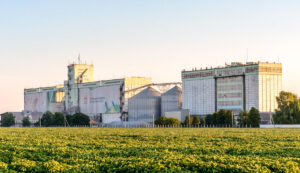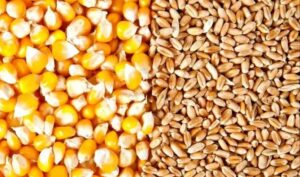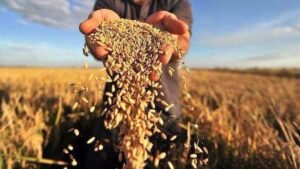
According to Fixygen, PJSC Myronivsky Plant of Cereals and Feedstuffs (MZVKK) will hold an extraordinary general meeting of shareholders on February 17, 2026, according to the issuer’s announcement.
The meeting will be held in the form of electronic voting. Registration of shareholders to participate in the meeting is scheduled for February 17 from 9:00 a.m. to 4:00 p.m., with the meeting to be held at 4:00 p.m. The date for compiling the list of shareholders eligible to participate is February 12, 2026.
The agenda includes issues regarding the appointment of an auditor for the mandatory audit of the 2025 financial statements and the granting of powers to conclude and sign an audit agreement. The draft decisions specify the appointment of Crow Erfolg Ukraine LLC and the authorization to sign the agreement to the chairman of the board of directors, Oleksandr Zhukotansky, with the right of subdelegation.
PJSC Myronivsky Plant for the Production of Cereals and Mixed Feed (EDRPOU 00951770) was registered on June 13, 1996, with a registered capital of UAH 40 million. The main activity in the registry data is the production of ready-made feed for farm animals.
CEREALS, compound feed, Myronivsky plant, shareholders' meeting

According to Fixygen, PJSC Myronivsky Plant of Cereals and Feedstuffs (MZVKK) will hold an extraordinary general meeting of shareholders on February 17, 2026, according to the issuer’s announcement.
The meeting will be held in the form of electronic voting. Registration of shareholders to participate in the meeting is scheduled for February 17 from 9:00 a.m. to 4:00 p.m., with the meeting to be held at 4:00 p.m. The date for compiling the list of shareholders eligible to participate is February 12, 2026.
The agenda includes issues regarding the appointment of an auditor for the mandatory audit of the 2025 financial statements and the granting of powers to conclude and sign an audit agreement. The draft decisions specify the appointment of Crow Erfolg Ukraine LLC and the authorization to sign the agreement to the chairman of the board of directors, Oleksandr Zhukotansky, with the right of subdelegation.
PJSC Myronivsky Plant for the Production of Cereals and Mixed Feed (EDRPOU 00951770) was registered on June 13, 1996, with a registered capital of UAH 40 million. The main activity in the registry data is the production of ready-made feed for farm animals.
CEREALS, compound feed, Myronivsky plant, shareholders' meeting

As of November 21, farmers harvested 50.93 million tons of grains and legumes from 10.23 million hectares, which is 88% of the area sown with these crops, the Ministry of Economy, Environment, and Agriculture reported on its website on Friday.
Last year, 53.4 million tons of grain and 19.5 million tons of oilseeds were harvested on the same date, meaning that this year’s figures are 4.6% and 12.6% lower, respectively, mainly due to the later start of the corn harvest.
As noted by the Ministry of Economy, 20.84 million tons of corn have been harvested from 3.12 million hectares, while last year at approximately the same date, 23.6 million tons were harvested from 3.7 million hectares.
As for wheat, its harvest is slightly higher than last year’s – 22.96 million tons from 5.05 million hectares compared to 22.40 million tons from 4.9 million hectares, while barley is slightly lower – 5.42 million tons from 1.36 million hectares compared to 5.6 million tons from 1.41 million hectares a year ago.
This year’s pea harvest is significantly higher – 672,500 tons from 275,100 hectares compared to 469,000 tons from 212,300 hectares last year, while buckwheat and millet are still significantly lower – 82,400 tons versus 131,700 tons and 62,100 tons versus 161,300 tons, respectively.
The harvest of other cereals and legumes this year reached 896.5 thousand tons from 327.6 thousand hectares as of November 21, compared to 1 million tons last year.
It is noted that among the leaders are Chernihiv region – 4.57 million tons, Khmelnytskyi – 4.89 million tons, Vinnytsia – 4.62 million tons, Odesa – 4.06 million tons.
As for oilseeds, their harvest as of November 21 is 17.05 million tons. In total, 92% of the sown area has been harvested for sunflowers and 96% for soybeans. The rapeseed harvest has been completed, and it turned out to be only slightly less than last year’s – 3.31 million tons compared to 3.5 million tons from almost the same area – about 1.3 million hectares.
However, there is a significant lag in the harvesting of soybeans and sunflowers, which is still ongoing: 4.72 million tons of soybeans have been harvested from 1.99 million hectares, compared to 6 million tons from 2.6 million hectares on the same date last year, while sunflower seeds – 8.92 million tons from 4.79 million hectares compared to 10.1 million tons from 4.9 million hectares.
In addition, sugar beet harvesting is also lagging behind: 94% of the production area has been harvested, yielding 9.96 million tons from 186,000 hectares, compared to 12 million tons from 251,200 hectares a year ago.
In its October inflation report, the National Bank of Ukraine increased its estimate of the grain and legume harvest in 2025 to 61.5 million tons from 57.9 million tons in the July report, while lowering its estimate of the oilseed harvest to 19.3 million tons from 21.0 million tons.
The NBU recalled that last year, the grain harvest in Ukraine fell to 56.2 million tons from 59.8 million tons in 2023, and oilseeds – from 21.7 million tons to 20 million tons.

In its October inflation report, the National Bank of Ukraine increased its estimate for the grain and legume harvest in 2025 to 61.5 million tons from 57.9 million tons in its July report, but lowered its estimate for the oilseed harvest to 19.3 million tons from 21.0 million tons.
“According to the NBU’s assumptions, in 2026-2027, grain and legume harvests will grow thanks to further increases in agricultural productivity and an increase in corn and other grain crops in regions less affected by climate change,” the document says.
However, according to the National Bank, the harvest of oilseeds, which are mainly grown in the southern regions, will be lower due to the negative impact of climate change, exacerbated by the long-term consequences of the destruction of the Kakhovka hydroelectric power plant for the region’s irrigation systems.
“The security situation in the frontline regions of the south will continue to have an impact, worsening conditions for the 2026 sowing campaign and slowing down the pace of land demining,” the report also says.
As a result, the National Bank has improved its grain harvest forecast for 2026 from 59.6 million tons to 62.9 million tons, and for 2027 from 60.4 million tons to 63.5 million tons.
At the same time, oilseed harvest expectations have been reduced to 21.4 million tons next year from 22.0 million tons, and to 22.2 million tons in 2027 from 22.8 million tons.
“However, the NBU expects the livestock sector to continue to make a negative contribution to agricultural value added due to a further reduction in livestock numbers (with the exception of poultry),” the report also notes.
According to the State Statistics Service, the volume of early crops (wheat, barley, rapeseed, legumes) as of October 1, 2025, reached 32.6 million tons, while the 2024 harvest yielded 31.9 million tons (+2.1%). The current growth is primarily due to higher yields of wheat (+3.9%) and legumes (+35%), while the barley harvest has practically reached last year’s level (-0.6%), and the rapeseed harvest is 10.7% lower than last year.
Earlier, the Experts Club analytical center made a video analysis of wheat production by the world’s leading countries for the period 1991-2024.

The President of the European Council, Charles Michel, supported the decision of the participants of the Black Sea Grain Initiative to extend the deal.
“I applaud the expansion of the Black Sea Grain Initiative. With 10 million tonnes of grain already exported from Ukraine through this initiative, this is good news for a world in dire need of access to grain and fertilizer,” Michel tweeted on Thursday.
At the same time, he highly appreciated the constant efforts of the United Nations in this direction, as well as its Secretary General António Guterres personally.
Earlier, Minister of Infrastructure of Ukraine Oleksandr Kubrakov said that the initiative for the safe transportation of agricultural products by the Black Sea was extended for another 120 days, the UN and Turkey remained guarantors of implementation.
According to Guterres, the grain initiative is needed to reduce food and fertilizer prices, as well as to prevent a global food crisis. He also stressed that the UN “is committed to work to remove obstacles to the export of food and fertilizers from Russia.”
In Istanbul on July 22, with the participation of the UN, Russia, Turkey and Ukraine, two documents were signed on the creation of a corridor for the export of grain from three ports on Ukrainian territory – Chornomorsk, Odessa and Yuzhny.

Ukraine since the beginning of the 2021/2022 marketing year (MY, July-June) and as of September 10, exported 10.29 million tonnes of grain and leguminous crops, which is 11.7% more than the figures for the same date of the previous MY.
According to the information and analytical portal of the agro-industrial complex of Ukraine, to date, Ukraine exported 5.92 million tonnes of wheat (4.1% less compared to the same date 2020/2021 MY); 2.99 million tonnes of barley (up 24.7%); 1.34 million tonnes of corn (2.2 times more); and 24,700 tonnes of flour (33.7% less).
As of the indicated date, 14,300 tonnes of rye were also exported, which is 9.5 times more than the indicators of the last MY.